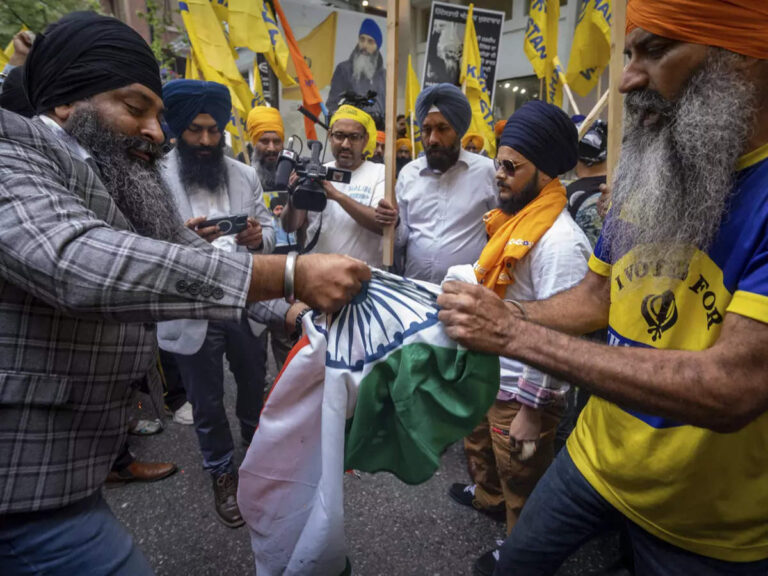
Khalistan issue is real or Politically motivated, lets examine..
Introduction
The concept of Khalistan, a separate Sikh state, has been a longstanding and contentious issue in the Indian context. Rooted in the historical, political, and religious complexities of the region, the Khalistan movement has generated significant debate, emotions, and even violence over the years. In this blog post, we will explore the history, factors, controversies, and the current state of the Khalistan movement in India.
Historical Background
To understand the Khalistan movement, it is essential to delve into the historical backdrop. Sikhism, a monotheistic religion founded in the late 15th century in the Punjab region of South Asia, has been an integral part of India’s cultural and religious tapestry. The Sikh community has faced periods of persecution and discrimination throughout history, which has contributed to the sentiment of marginalization.
The modern Khalistan movement can be traced back to the 1970s and 1980s when a segment of Sikhs began advocating for an independent Sikh state called Khalistan. This demand was primarily fueled by various factors, including political grievances, perceived discrimination, and a desire for greater autonomy.
Factors Behind the Khalistan Movement
Political Grievances: A significant catalyst for the Khalistan movement was political discontent within the Sikh community. Some Sikhs felt marginalized and disenfranchised within the Indian political landscape.
Operation Blue Star: In 1984, the Indian government ordered Operation Blue Star, a military operation aimed at flushing out militants who had taken refuge in the Golden Temple in Amritsar. The operation resulted in significant damage to the temple and the death of many innocent civilians, leading to widespread anger among Sikhs.
Assassination of Indira Gandhi: The assassination of Prime Minister Indira Gandhi in 1984 by her Sikh bodyguards sparked anti-Sikh riots in Delhi and other parts of India, resulting in the deaths of thousands of Sikhs.
External Support: Some Sikh diaspora communities, particularly in the United States, Canada, and the United Kingdom, have supported the Khalistan movement, both financially and morally.
Controversies Surrounding Khalistan
Terrorism: The Khalistan movement has been marred by acts of terrorism, including bombings and assassinations. These violent incidents have often overshadowed the political demands of the movement and have been a source of controversy.
International Reaction: India has consistently opposed external support for the Khalistan movement, accusing foreign governments of harboring and supporting Sikh separatist elements. This has strained diplomatic relations.
Human Rights Concerns: Human rights organizations have raised concerns about alleged human rights abuses committed by Indian security forces during counterinsurgency operations in Punjab in the 1980s and 1990s.
The Current State of Khalistan
In recent years, the Khalistan movement has lost much of its momentum, but it still remains a topic of discussion within the Sikh diaspora. The Indian government has taken steps to address some of the political grievances of the Sikh community, such as increasing political representation.
However, it is essential to note that the majority of Sikhs in India do not support the idea of Khalistan, and the movement is largely viewed as a fringe element. The Sikh community has continued to play a significant role in Indian society and politics, with Sikhs holding prominent positions in various fields.
Canada has a significant Sikh population, and the issue of Khalistan has occasionally been a point of controversy and discussion within Canadian politics and society. Here are some key points related to this issue:
- Sikh Diaspora in Canada: Canada is home to a large Sikh diaspora, primarily concentrated in the province of British Columbia and the Greater Toronto Area. Many Sikhs in Canada have maintained strong cultural and religious ties to Punjab, India, and are engaged in both Canadian and Indian politics.
- Political Involvement: Some Canadian politicians of Sikh descent have been associated with Sikh nationalist sentiments or have been accused of supporting Khalistan. However, it’s important to note that the Sikh community in Canada, like any other community, is diverse, and opinions on this issue vary widely.
- Controversies: Over the years, there have been controversies and debates in Canada related to the display of Khalistan flags or symbols during public events. Some individuals or groups have used these symbols to express their support for Khalistan, which has at times caused diplomatic tensions between Canada and India.
- Government Response: The Canadian government, under Prime Minister Justin Trudeau, has emphasized the importance of freedom of expression and has been cautious about infringing upon individuals’ rights to express their political views. However, Trudeau and his government have also been clear about not supporting any form of violence or terrorism associated with the Khalistan movement.
Conclusion
The Khalistan movement in the Indian context is a complex and controversial issue rooted in historical grievances, political discontent, and external influences. While the movement has lost much of its momentum in recent years, it remains a subject of debate and discussion. It is crucial for all stakeholders, including the Indian government, Sikh leaders, and the international community, to engage in dialogue and address the underlying issues to promote peace, unity, and inclusivity in the diverse tapestry of India.
@aditya
